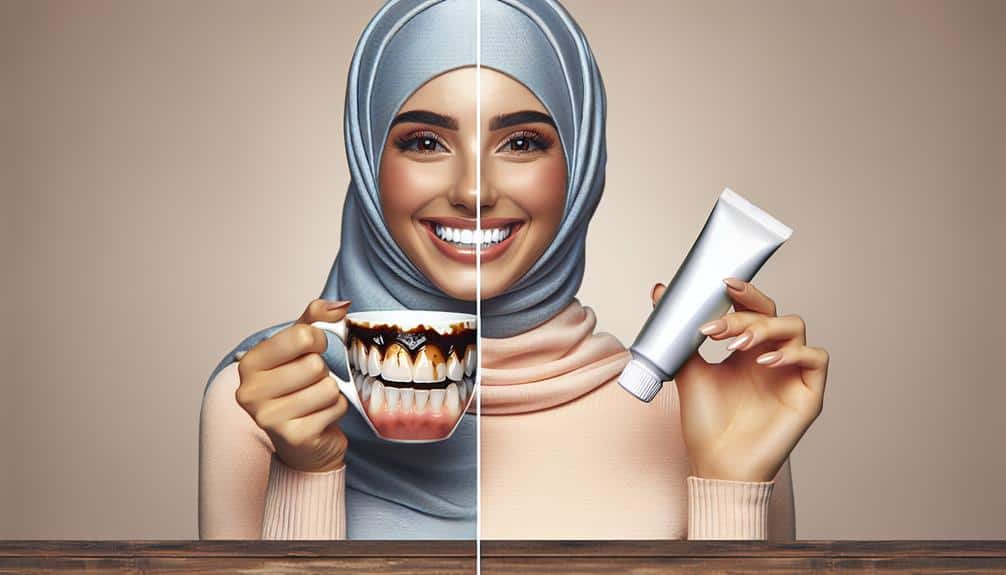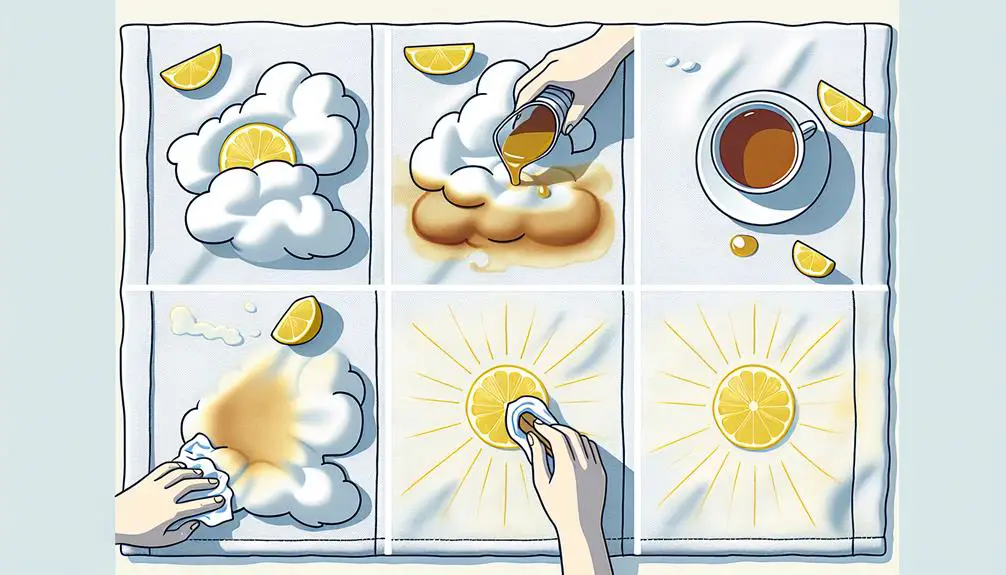Combat tea stains on your teeth with effective whitening techniques. Try natural remedies like lemon juice and baking soda paste, coconut oil pulling, or activated charcoal. For professional results, consider in-office procedures, take-home kits, or laser treatments administered by experienced dentists. Incorporate citrus fruits, baking soda, and moderation for brighter teeth. Make lifestyle changes like reducing tea intake, eating teeth-cleaning foods, and maintaining good oral hygiene for lasting results. Uncover the secrets to removing tea stains and achieving a whiter smile effortlessly.
Key Points
- Professional dental cleanings effectively remove stubborn tea stains.
- DIY remedies like lemon juice and baking soda can help whiten teeth naturally.
- Limit tea intake and use natural ingredients to prevent and reduce stains.
- Lifestyle changes, like eating crunchy fruits, aid in maintaining a white smile.
- Consistent oral hygiene practices and regular dental check-ups are crucial for removing tea stains.
Tea Stains: Causes and Prevention
Tea stains on teeth are mainly caused by the tannins present in tea, which have a vital affinity for tooth enamel, leading to discoloration over time. To prevent this, it's essential to maintain good dental hygiene practices. Regular brushing with a fluoride toothpaste, flossing, and rinsing with an antiseptic mouthwash can help in preventing discoloration caused by tea stains.
Additionally, scheduling regular dental cleanings with your dentist is crucial to remove any surface stains and plaque buildup that may contribute to the discoloration of your teeth.
When it comes to tea stain removal, professional dental cleanings are the most effective way to eliminate stubborn stains. Dental hygienists use specialized tools and techniques to remove surface stains and polish your teeth, restoring their natural color and shine. By following these preventive measures and seeking professional dental care, you can effectively combat tea stains and maintain a bright, white smile.
DIY Whitening Remedies at Home
To effectively address tea stains on your teeth, consider incorporating DIY whitening remedies at home as a proactive approach towards achieving a brighter smile. Lemon juice and baking soda can be combined to create a natural whitening paste. Lemon juice's acidic nature helps break down stains, while baking soda acts as a gentle abrasive to scrub them away. Mix a small amount of lemon juice with baking soda to form a paste, then apply it to your teeth using a toothbrush. Be cautious not to overuse this mixture, as the acidity of lemon juice can potentially damage tooth enamel over time.
Another popular DIY remedy involves using coconut oil or activated charcoal. Coconut oil pulling, where you swish coconut oil around in your mouth for several minutes, is believed to help remove stains. Activated charcoal, when used in moderation, can also aid in absorbing stains and toxins from the teeth. Remember that while DIY remedies can be effective, moderation and consistency are key to preventing any adverse effects on your oral health.
Professional Whitening Treatments Overview
Considering various options for achieving a brighter smile, professional whitening treatments provide a thorough overview of effective methods for removing stubborn tea stains on teeth. When seeking cosmetic dentistry procedures to brighten your smile and remove tea stains, professional whitening treatments are among the most popular choices.
Here are three common professional whitening treatments:
- In-Office Whitening: One of the quickest ways to whiten teeth is through in-office whitening procedures. During this treatment, a professional dentist applies a whitening gel to your teeth and often uses a special light or laser to enhance the whitening process.
- Take-Home Whitening Kits: These kits are provided by dentists for home use. They typically consist of custom-made trays and a professional-grade whitening gel. The trays are worn for a specified period each day for gradual whitening results.
- Laser Treatments: Laser treatments involve using a laser to activate the bleaching agent applied to the teeth, resulting in faster and more efficient whitening compared to traditional methods.
Professional whitening treatments conducted by experienced dentists can effectively remove tea stains and significantly brighten your smile.
Natural Ingredients for Brighter Teeth
For naturally brighter teeth, incorporating certain ingredients found in everyday household items can assist in reducing stains and enhancing your smile. Citrus fruits, such as lemons and oranges, are known for their effectiveness in brightening teeth due to their natural acidity. The citric acid in these fruits helps break down stains and whiten teeth over time.
You can create a simple teeth-whitening paste by mixing a few drops of lemon or orange juice with baking soda. Baking soda is a mild abrasive that can gently scrub away surface stains on teeth without being too harsh on the enamel.
To make the paste, mix a small amount of baking soda with enough citrus juice to form a paste-like consistency. Brush this mixture onto your teeth using a toothbrush, leave it on for a couple of minutes, and then rinse thoroughly. It's important not to overuse this method as the acidity of the citrus fruits can potentially wear down the enamel if used excessively.
Incorporating these natural ingredients into your oral care routine can help maintain a brighter smile and reduce the appearance of tea stains on your teeth.
Lifestyle Changes for Long-Term Results
Implementing sustainable changes in your daily habits can contribute greatly to achieving long-term results in maintaining a bright and healthy smile.
To guarantee the longevity of your teeth whitening efforts, consider the following lifestyle changes:
- Dietary Habits: What you eat can have a huge impact on the color of your teeth. Limiting the intake of tea, coffee, red wine, and highly pigmented foods like berries can help prevent staining. Incorporating crunchy fruits and vegetables like apples and carrots can naturally clean your teeth and stimulate saliva production, which aids in neutralizing acids that can erode enamel.
- Oral Hygiene: Consistent oral hygiene practices are essential for maintaining a white smile. Brush your teeth at least twice a day with a whitening toothpaste containing fluoride. Floss daily to remove plaque and prevent staining in between teeth. Additionally, consider using a mouthwash that targets stains and strengthens enamel.
- Regular Dental Check-ups: Visiting your dentist for regular cleanings and check-ups is crucial for long-term oral health and maintaining white teeth. Professional cleanings can remove stubborn stains and ensure any dental issues are addressed promptly, helping you achieve a radiant smile that lasts.
Frequently Asked Questions
Can Tea Stains on Teeth Cause Any Long-Term Damage to Oral Health?
Tea stains on teeth can potentially lead to long-term damage to oral health if not addressed. Prevention techniques like regular dental cleanings and proper oral hygiene can help avoid such issues. Stain removal methods are essential for maintaining good oral health.
Are There Any Specific Types of Tea That Are More Likely to Cause Stains on Teeth?
When it comes to tea types causing stains, darker teas like black tea are more likely culprits. To prevent staining, consider moderation, rinsing with water, or drinking through a straw. Your diet choices can impact your smile's brightness.
How Soon After a Professional Whitening Treatment Can I Drink Tea Without Worrying About Staining My Teeth Again?
After a professional whitening treatment, wait at least 48 hours before resuming tea consumption. To maintain whitening effects, consider using a straw to limit contact with teeth. Regular dental check-ups can help monitor staining and provide additional tips for upkeep.
Is It Possible to Over-Whiten Teeth With At-Home Remedies, and What Are the Potential Risks?
When whitening teeth at home, it's possible to overdo it, leading to increased teeth sensitivity. Over-whitening with at-home remedies can weaken enamel, causing harm. Be cautious and follow guidelines to avoid risks.
Are There Any Foods or Drinks That Can Help Prevent Tea Stains From Forming on Teeth in the First Place?
To prevent tea stains, focus on preventive measures like smart dietary choices. Incorporate foods rich in calcium and vitamin C. Limit tea consumption, rinse your mouth after drinking, and practice good oral hygiene.



